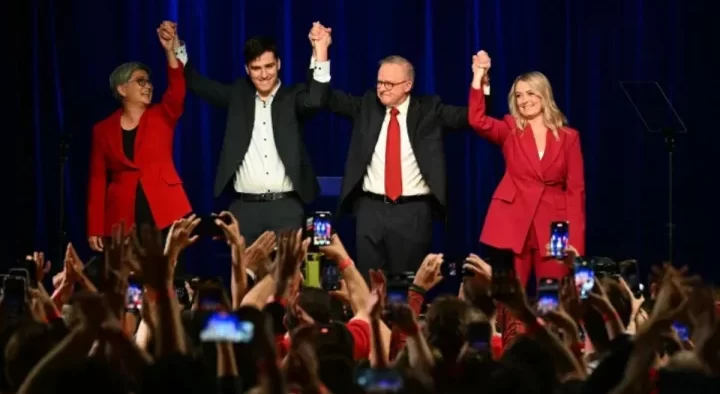This election result shows Labor learned a lesson that the Coalition did not

The prime minister emphasised that positive message in addressing an ecstatic Labor crowd on Saturday night.
Laura Tingle:
The story of the 2025 election was about a shambolic Coalition campaign.
And, on election night, the shock and story were focused on the collapse of the Coalition vote and of the demise of Opposition Leader Peter Dutton and so many of his lieutenants.
But the extraordinary poll result — on par with the worst result for any major party since 1949 — was won by a campaign that was overwhelmingly positive and framed around the future.
he prime minister emphasised that positive message — and one of social cohesion — in addressing an ecstatic Labor crowd on Saturday night.
He spoke of “unity, fairness, equality and respect for another” and warned them against cheering Dutton’s political demise.
“What we do in Australia is, we treat people with respect,” he said.
Has Video Duration: 46 seconds.
Celebration from Labor HQ
Coalition learns wrong lessons from referendum
The analysis of the past three years has focused heavily on the huge amount of political capital that Labor and the prime minister spent on the Voice.
And it was true that a surly electorate felt its concerns were being ignored.
But what also happened as a result of the Voice was that the Coalition came to believe that the sort of negative campaigning it used in that referendum was the recipe for a successful political tactic on a broader scale.
It had thus also wasted its energy, capital and credibility wrecking the Voice and not spending the time on developing a serious policy platform.
This thinking was only reinforced by the spectre of Donald Trump’s success in 2024.
As a sign of the hubris that pervaded by early this year, at the first shadow cabinet meeting of this year, shadow ministers were instructed to draft what are known as charter letters.
The charter letters set out what is expected of ministers and their departments when they are sworn in.
Labor learned the lesson that it needed to focus on the concerns of voters. The Coalition did not.
As Treasurer Jim Chalmers put it on the ABC on election night, Labor understood, particularly in an increasingly uncertain world, it did not have the time or luxury to stuff around on second-tier issues.
Peter Dutton congratulated the prime minister in his concession speech. (ABC News: Matt Roberts)
Culture wars are a crutch
The Coalition’s economic policy proposals were not credible. Dutton and Angus Taylor flatly asserted that the Coalition would achieve better economic outcomes on inflation, productivity and growth without a shred of evidence or argument about how or why it would achieve those things.
Dutton’s long-term focus on national security, defence and border protection perhaps blinded him to the need to get serious about economic policy.
The Coalition resorted to anti-immigration sentiment, attempted to fuel irritation with welcomes to country, suggested the government had plans to re-prosecute the Voice, spoke about a woke school curriculum and raged about the hate media.
It prosecuted all these points with the fulsome support of News Corp’s newspapers and its hold on regional Australian television via Sky News.
It ignored issues like cost of living, health care, roads, education and security even after identifying that these were points of vulnerability for the government in the lead-up to the campaign.
Similarly, the Greens adopted grievance politics. And they have also been comprehensively rejected.
The Coalition now finds itself without any representation in Adelaide, Hobart or Melbourne and has only a couple of seats in Brisbane.
Which brings us back to those messages of unity, fairness, equality and respect for one another which the prime minister spoke of on Saturday night.
A chance to change how we talk about the future
It has been so long since we have not had culture wars or grievances dominating our politics — or its undertones — it is hard to imagine what it might look like.
It opens up the scope for rational discussion about policy at a time when we need it.
Any re-election victory would have increased the authority and confidence of the prime minister. But the comprehensive nature of this particular win gives him the chance to change the narrative of our politics, as well as the policy discussion.
The caveat on all this of course is what results we see in the Senate — and its implications for the extent of any legislative agenda.
But even if constrained in the upper house, the government has a chance to change the way we talk about our future.
Laura Tingle is 7.30’s political editor. ABC News











